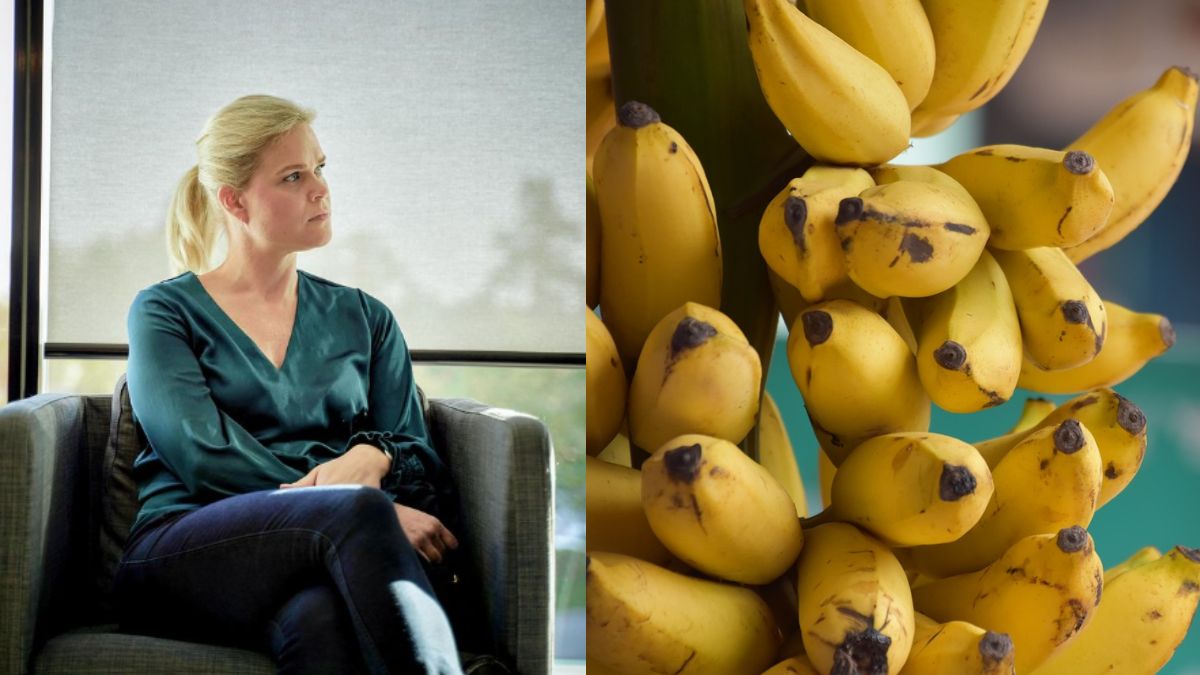Not all fruits are equal for Sweden’s equality minister.
Paulina Brandberg, Sweden’s Minister for Gender Equality and Work Life, is at the centre of national gossip due to an unusual fear — bananas.
According to Swedish tabloid Expressen, leaked emails this week reveal the extent of her banana phobia, so severe that her staff meticulously clear any trace of the yellow fruit from rooms before she steps inside.
Brandberg has previously admitted to the quirky fear, labelling it “the world’s weirdest phobia.” Yet, the revelation of just how far her team goes to keep her surroundings ‘banana-free’ has made this curious phobia a talking point in the Nordic country.
Here’s what we know.
Paulina Brandberg’s bananaphobia
In a series of emails reviewed by Expressen, Paulina Brandberg’s staff have gone to great lengths to ensure the Minister does not encounter bananas in any rooms or venues she visits.
“Paulina Brandberg has a strong allergy to bananas, so it would be appreciated that there are no bananas in the areas where she will be staying,” stated one email sent from the Ministry to the Norwegian Judicial Agency ahead of a VIP lunch.
Brandberg’s aversion to bananas, however, is not an actual allergy, but a specific phobia. In response to Expressen, she described it as a “sort of allergy” and revealed that it’s “something I’m getting professional help for.”
Another email from her team to a county administrative board made it clear that “no bananas are allowed on the premises.”
In a separate message to Swedish Parliament Speaker Andreas Norlén, Brandberg’s staff requested that “no traces of bananas” be present in the areas where she would be during a meeting.
“It would be fantastic if you could remove [fruit bowls containing bananas] in the morning before she visits,” read an email from Brandberg’s assistant.
Brandberg has previously shared that this great fear impacts her well-being. “The issue is something that affects me as a person, which I think can stay that way,” she admitted in a now-deleted post on X, acknowledging her banana phobia.
Why people have weird phobias
While banana phobia might sound made up, it is a real and rare condition that can affect a person’s physiological, emotional and behavioural well-being when in contact with bananas.
Dr Martin Antony, a clinical psychologist, suggests in the American Psychological Association, that phobias are a result of the brain’s “fight or flight” response, where harmless triggers are misinterpreted as threats, leading to exaggerated fears.
Experts said phobias like these often develop in childhood. However, in many cases, the exact cause remains unclear, with the phobia developing for reasons that are deeply individual or hard to pinpoint scientifically.
According to Klarity Health, a person may experience intense anxiety, nausea, sweating, dizziness, and in some extreme cases, panic attacks if they have a phobia.
Taking counselling and medical support can help manage the condition.
Opposition MP also opens up about her fear of bananas
Following the revelation of Paulina Brandberg’s phobia, Opposition MP Teresa Carvalho, a Social Democratic legal policy spokesperson, revealed she also shares a fear of bananas.
In a post on X, Carvalho expressed solidarity with Brandberg, referring to their shared fear as a “common enemy.” “We may have had many tough debates about working conditions, but on this issue, we stand united.”
Sweden’s Prime Minister, Ulf Kristersson, weighed in on the discussion, clarifying that Brandberg’s phobia had not interfered with governmental duties. He also criticised those who mocked the minister’s fear.
“I have all the respect for people who have different phobias,” he said. “I am disturbed when a hard-working cabinet minister is almost reduced to a phobia and people make fun of it. I think you should be too good for that,” he was quoted as saying by The Guardian.
Finance Minister Elisabeth Svantesson also voiced support for Brandberg on X, calling Expressen’s coverage of the issue a “real low point.”
“Just like everyone else, politicians can also struggle with fears, phobias and anxiety,” she said. “If it doesn’t affect their work, is it really a matter of public interest?”
With input from agencies


)

)
)
)
)
)
)
)
)



